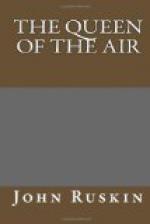feeble of perseverance in them, sullied or shameful
in the indulgence of them, their expression by musical
sound becomes broken, mean, fatuitous, and at last
impossible; the measured waves of the air of heaven
will not lend themselves to expression of ultimate
vice, it must be forever sunk into discordance or
silence. And since, as before stated, every
work of right art has a tendency to reproduce the ethical
state which first developed it, this, which of all
the arts is most directly in power of discipline;
the first, the simplest, the most effective of all
instruments of moral instruction; while in the failure
and betrayal of its functions, it becomes the subtlest
aid of moral degradation. Music is thus, in
her health, the teacher of perfect order, and is the
voice of the obedience of angels, and the companion
of the course of the spheres of heaven; and in her
depravity she is also the teacher of perfect disorder
and disobedience, and the Gloria in Excelsis becomes
the Marseillaise. In the third section of this
volume, I reprint two chapters from another essay
of mine ("The Cestus of Aglaia"), on modesty or measure,
and on liberty, containing further reference to music
in her two powers; and I do this now, because, among
the many monstrous and misbegotten fantasies which
are the spawn of modern license, perhaps the most
impishly opposite to the truth is the conception of
music which has rendered possible the writing, by
educated persons, and, more strangely yet, the tolerant
criticism, of such words as these: “This
so persuasive art is the only one that has no didactic
efficacy, that engenders no emotions save such as
are without issue on the side of moral truth, that
expresses nothing of God, nothing of reason, nothing
of human liberty.” I will not give the
author’s name; the passage is quoted in the
“Westminster Review” for last January [1869].
43. I must also anticipate something of what
I have to say respecting the relation of the power
of Athena to organic life, so far as to note that
her name, Pallas, probably refers to the quivering
or vibration of the air; and to its power, whether
as vital force, or communicated wave, over every kind
of matter, in giving it vibratory movement; first,
and most intense, in the voice and throat of the bird,
which is the air incarnate; and so descending through
the various orders of animal life to the vibrating
and semi-voluntary murmur of the insect; and, lower
still, to the hiss or quiver of the tail of the half-lunged
snake and deaf adder; all these, nevertheless, being
wholly under the rule of Athena as representing either
breath or vital nervous power; and, therefore, also,
in their simplicity, the “oaten pipe and pastoral
song,” which belong to her dominion over the
asphodel meadows, and breathe on their banks of violets.
Finally, is it not strange to think of the influence
of this one power of Pallas in vibration (we shall
see a singular mechanical energy of it presently in
the serpent’s motion), in the voices of war and
peace? How much of the repose, how much of the
wrath, folly, and misery of men, has literally depended
on this one power of the air; on the sound of the
trumpet and of the bell, on the lark’s song,
and the bee’s murmur!




